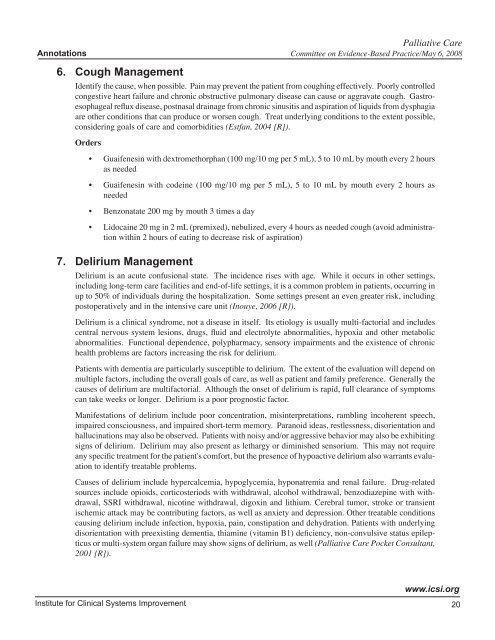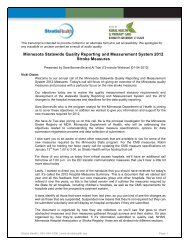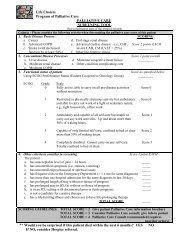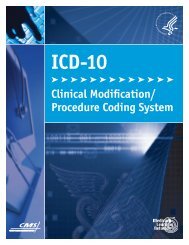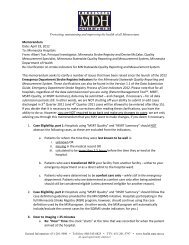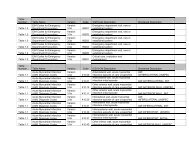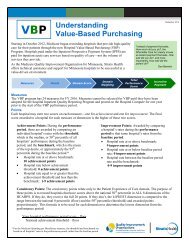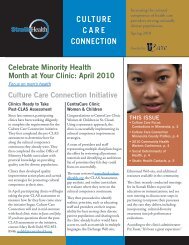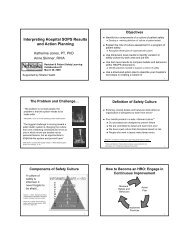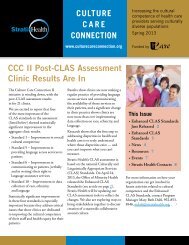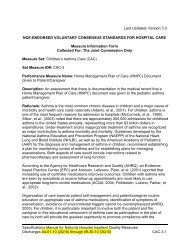Palliative Care Order Set - Stratis Health
Palliative Care Order Set - Stratis Health
Palliative Care Order Set - Stratis Health
You also want an ePaper? Increase the reach of your titles
YUMPU automatically turns print PDFs into web optimized ePapers that Google loves.
<strong>Palliative</strong> <strong>Care</strong><br />
Annotations Committee on Evidence-Based Practice/May 6, 2008<br />
6. Cough Management<br />
Identify the cause, when possible. Pain may prevent the patient from coughing effectively. Poorly controlled<br />
congestive heart failure and chronic obstructive pulmonary disease can cause or aggravate cough. Gastroesophageal<br />
reflux disease, postnasal drainage from chronic sinusitis and aspiration of liquids from dysphagia<br />
are other conditions that can produce or worsen cough. Treat underlying conditions to the extent possible,<br />
considering goals of care and comorbidities (Estfan, 2004 [R]).<br />
<strong>Order</strong>s<br />
• Guaifenesin with dextromethorphan (100 mg/10 mg per 5 mL), 5 to 10 mL by mouth every 2 hours<br />
as needed<br />
• Guaifenesin with codeine (100 mg/10 mg per 5 mL), 5 to 10 mL by mouth every 2 hours as<br />
needed<br />
• Benzonatate 200 mg by mouth 3 times a day<br />
• Lidocaine 20 mg in 2 mL (premixed), nebulized, every 4 hours as needed cough (avoid administration<br />
within 2 hours of eating to decrease risk of aspiration)<br />
7. Delirium Management<br />
Delirium is an acute confusional state. The incidence rises with age. While it occurs in other settings,<br />
including long-term care facilities and end-of-life settings, it is a common problem in patients, occurring in<br />
up to 50% of individuals during the hospitalization. Some settings present an even greater risk, including<br />
postoperatively and in the intensive care unit (Inouye, 2006 [R]).<br />
Delirium is a clinical syndrome, not a disease in itself. Its etiology is usually multi-factorial and includes<br />
central nervous system lesions, drugs, fluid and electrolyte abnormalities, hypoxia and other metabolic<br />
abnormalities. Functional dependence, polypharmacy, sensory impairments and the existence of chronic<br />
health problems are factors increasing the risk for delirium.<br />
Patients with dementia are particularly susceptible to delirium. The extent of the evaluation will depend on<br />
multiple factors, including the overall goals of care, as well as patient and family preference. Generally the<br />
causes of delirium are multifactorial. Although the onset of delirium is rapid, full clearance of symptoms<br />
can take weeks or longer. Delirium is a poor prognostic factor.<br />
Manifestations of delirium include poor concentration, misinterpretations, rambling incoherent speech,<br />
impaired consciousness, and impaired short-term memory. Paranoid ideas, restlessness, disorientation and<br />
hallucinations may also be observed. Patients with noisy and/or aggressive behavior may also be exhibiting<br />
signs of delirium. Delirium may also present as lethargy or diminished sensorium. This may not require<br />
any specific treatment for the patient's comfort, but the presence of hypoactive delirium also warrants evaluation<br />
to identify treatable problems.<br />
Causes of delirium include hypercalcemia, hypoglycemia, hyponatremia and renal failure. Drug-related<br />
sources include opioids, corticosteriods with withdrawal, alcohol withdrawal, benzodiazepine with withdrawal,<br />
SSRI withdrawal, nicotine withdrawal, digoxin and lithium. Cerebral tumor, stroke or transient<br />
ischemic attack may be contributing factors, as well as anxiety and depression. Other treatable conditions<br />
causing delirium include infection, hypoxia, pain, constipation and dehydration. Patients with underlying<br />
disorientation with preexisting dementia, thiamine (vitamin B1) deficiency, non-convulsive status epilepticus<br />
or multi-system organ failure may show signs of delirium, as well (<strong>Palliative</strong> <strong>Care</strong> Pocket Consultant,<br />
2001 [R]).<br />
www.icsi.org<br />
Institute for Clinical Systems Improvement<br />
20


